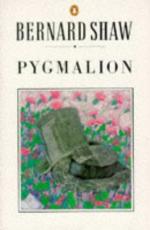|
|
Pygmalion Author/Context
George Bernard Shaw was born in Dublin, Ireland in 1856 to Lucinda and George Shaw. His father was a corn merchant who suffered from alcoholism, and his mother was a house wife and singer. Lucinda ran away to London with her voice teacher, George Lee. All her children followed her there. After a fall out with Lee, Shaw's mother pursued an unconventional teaching career in singing using the techniques Lee taught her.
Shaw began working as a clerk in a land agency at the age of fifteen, but abandoned that career before age twenty and resolved to fashion himself as a modern Shakespeare. He came of age as a writer in the late Victorian era, and much of his work demonstrated a rebellion against the morays of the time. Shaw's first essays into the writing profession were as a music and art critic, and his success allowed him to expand the range and style of his criticism. He developed into an extremely prolific playwright, novelist, and lecturer. Shaw was an active Fabian socialist and a supporter of feminists and homosexuals. His aggressive and diverse social commentaries kept him in the public eye throughout his long life. Shaw died in 1950, at the age of 94.
Pygmalion is the most famous and perhaps most beloved of Shaw's many plays. Shaw was often criticized for writing plays full of unsubstantial, if witty, banter. With Pygmalion, Shaw challenged his critics by making both the subject and the content of the play speech. He used phonetics and Ovid's story of Pygmalion as a means of defending his artistic creation and addressing feminist issues. Several film adaptations have been made of the play, one of which garnered Shaw an Academy Award for best screenplay in 1938.
Bibliography
ed. S. Winsten. G.B.S. 90: Aspects of Bernard Shaw's Life and Work. London: Hutchinson & Co. Ltd., 1946.
ed. Christopher Innes. The Cambridge Companion to George Bernard Shaw. Cambridge: Cambridge University Press, 1998.
Shaw, Bernard. Pygmalion. London: Penguin Books, 2000.




